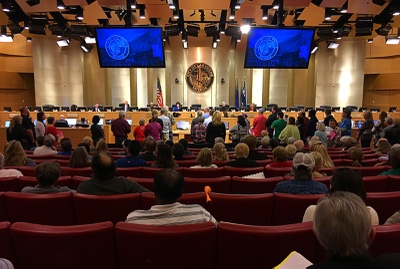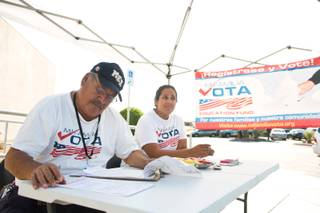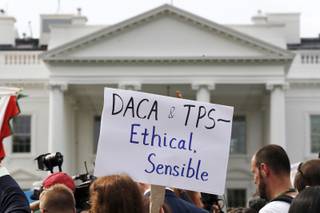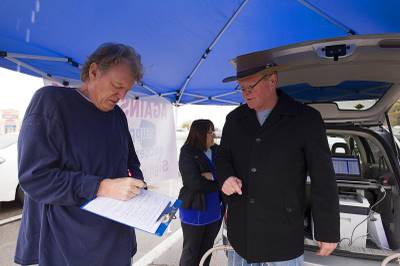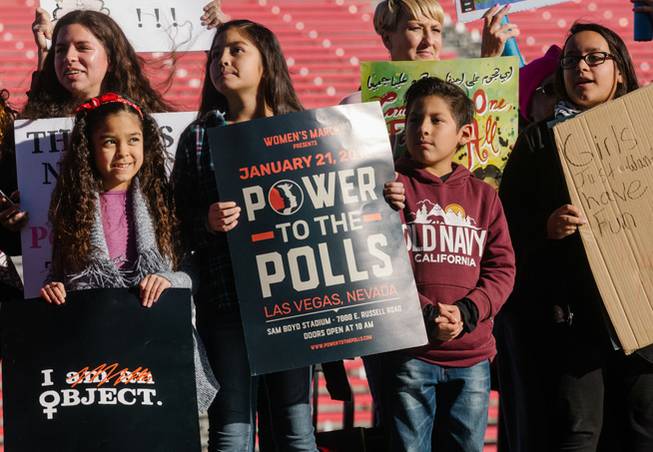
Young attendees hold protest signs during the Women’s March: Power to the Polls event at Sam Boyd Stadium, Sunday, Jan. 21, 2018.
Thursday, March 15, 2018 | 2 a.m.
6 ways to get involved with technology
• Countable: Send your representatives your yay or nay votes on new laws—and keep track of theirs—on this streamlined legislation app.
• Gather: A digital HQ for protests and activism groups you can join—or start.
• Buycott: Shoppers looking to monitor where their dollars ultimately go can use this app’s UPC scanner on products to discover what causes the parent corporations endorse.
• Indivisible: This app not only lets you reach and catch up on your elected reps, but provides tip-offs on potential activism opportunities with local grassroots organizations.
• Resistbot: Too many apps clogging your smartphone? Text RESIST to 50409 and this SMS service (also usable on Facebook Messenger and Telegram) will help you pinpoint officials and send them messages that turn into faxed/emailed formal letters.
• Brigade: Politicking on social media could shrink your inner circle—unless you’re on a social network built expressly for politics. Declare your causes on your Brigade profile, then engage and organize.
The long, grueling and combative 2016 election had at least one silver lining. According to the website VolunteerMatch, its highest-ever traffic numbers happened four days after Donald Trump’s inauguration and two days after he won the presidency. Involvement increased, and theories abound as to why. Some people wanted to rally around issues they were passionate about (like human rights); others sought positivity after two years of constant discord. They also felt compelled to assist those struck by disaster and tragedy—look no further than our galvanizing response to the October 1 shooting for proof.
Las Vegas’ growing interest in civic engagement extends beyond volunteering. We’ve been demonstrating, especially with regards to equality for women, African-Americans and immigrants, and most recently at our schools. We’ve also been filling school board meetings that address topics like gender rights. But as our city and society in general face growing challenges, we must not only sustain participation, but expand it further and execute it properly. We must also go beyond donations (though money certainly helps; visit page 8 for a primer on giving). Which is why the Weekly has crafted this comprehensive guide to getting involved. If you’ve ever desired to manifest your inner activist—or merely maintain the health of our civilization—this how-to package is for you.
How to assist in political campaigns
• For Republicans: This election year, Republicans are seeking to capitalize on the presidential win in 2016 by maintaining control of Congress. Greg Bailor, Nevada Republican Party executive director, said people who want to get involved can go to Republican Leadership Initiative trainings conducted regularly throughout the state. Session dates are posted here.
• For Democrats: Democrats saw losses nationally in 2016, but Nevada appeared to be a bright spot, taking control of the Legislature, siding with Hillary Clinton and sending Catherine Cortez Masto to the U.S. Senate. And while Clinton lost nationally, this positioned incumbent Dean Heller to be the only Republican senator up for re-election in a state that Clinton won.
Residents looking to get involved in the Democratic effort this cycle can inquire about volunteering opportunities at nvdems.com, said Helen Kalla, Nevada State Democratic Party spokeswoman, adding that becoming an organizer—registering people to vote, knocking on doors or texting voters—is a great way to gain experience and start a career working on campaigns.
How to attend public meetings
Last month, local nonprofit Vegas Roots received a $99,500 community grant to operate its mobile food truck after making its case during City of Henderson public meetings. Another nonprofit, Gender Justice, attends almost all of the Clark County School District meetings to advocate for a gender-diverse policy. And countless small businesses and individuals voice their concerns to their representatives face-to-face, whether seeking a business license or voicing annexation concerns of unincorporated Clark County.
Municipalities typically post their agendas three business days before meetings. If your concern isn’t on the agenda, you can present your case during public comment. You must complete and submit a speaker card, however. Research your topic and consider writing notes, as you might only receive a minute to speak. Finally, identify your government body below and mark your calendars accordingly.
• Clark County Commission: Meets during the first and third Tuesday of the month at 9 a.m. at Clark County Government Center. For full meeting info, go here.
• Las Vegas City Council Meets every first and third Wednesday of the month at 9 a.m at Las Vegas City Hall. For more info, go here.
• Henderson City Council: Meets every first and third Tuesday of the month at 6 p.m. at Henderson City Hall. For more info, go here.
• North Las Vegas City Council: Meets every first and third Wednesday of the month at 6 p.m. at North Las Vegas City Hall. For more info, go here.
• Boulder City Council: Meets every second and fourth Tuesday of the month at 7 p.m. at the Boulder City Hall. For more info, go here.
• CCSD School Board Meets every second and fourth Thursday of the month at 5 p.m. at the Edward A. Greer Education Center, 2832 E. Flamingo Road. For more info, go here.
Can’t make it? All local municipalities offer live-streaming of their meetings on their respective websites.
5 ways you can help the environment
1. Support Get Outdoors Nevada. Formerly known as the Outside Las Vegas foundation, GON is dedicated to the care and preservation of Nevada’s public land—its parks, its trails, its natural wonders. You can support GON’s mission through donations—several of the nonprofit’s projects require ongoing support, including maintenance of the Arts District’s October 1 Healing Garden—or by picking up a rake and volunteering to help clean up Nevada’s public lands.
2. Join RTC’s Club Ride. The Regional Transportation Commission of Southern Nevada partners with local employers to encourage carpooling, telecommuting and public transit—and it rewards alternative commuters with gift cards and other goodies.
3. Consider going solar. NVEnergy’s SolarGenerations program offers incentives for installing approved solar panels to help power your home. See a price breakdown and list of approved equipment here.
4. Use your vote to protect the Gold Butte and Basin and Range national monuments. These two nature reserves—located 90 and 115 miles from Las Vegas, respectively—have been identified by Interior Secretary Ryan Zinke as candidates for reduction or losing their protected status outright. That could mean the loss of flora and fauna found nowhere else on Earth—and, in the case of Basin and Range, an easier reboot for the Yucca Mountain nuclear waste depository. Hold your candidates accountable for these lands.
5. Recycle your e-waste. Don’t put broken televisions, old phones and spent batteries in the trash; they contain hazardous materials that shouldn’t go into landfills. Several local firms—among them Nevada State Recycle and All Green Recycling—will see that these items are properly re-used. –Geoff Carter
How to be a good voter
“Most people want to be the architects of their own future,” said Electra Skrzydlewski, regional representative for Sen. Catherine Cortez Masto. “Voting is the most fundamental way to decide for yourself how power brokers interact with your own life.”
And registering to vote (at clarkcountynv.gov/election; final deadline is May 24) in a midterm election year is vitally important, Skrzydlewski said. “Midterm elections are some of the most important to a person’s everyday life. These are the folks that are going to be representing you on your city council, on your school board; these are the people that determine where your stoplights are going.”
Okay, so we’ll register. But what if we’re not sure who to vote for, or how to support them? Skrzydlewski suggested partisan voters contact their parties with questions or for volunteering opportunities, and that undecided voters talk to a nonpartisan 501(c)3 community organization, like the League of Women Voters. “If there’s something that you care about and you’re not necessarily sure how that translates into policy, those nonprofits can help you learn about how to get involved,” she said.
Either way, don’t let indecision ground you this year. “Somebody may not be prepared to choose the best person to represent them, but they’re pretty clear on what matters to them on a day-to-day basis,” Skrzydlewski said. Go out and find your fellow architects.
How to go about volunteering
Wading into the waters of volunteering can lead to a lot of treading in place. Not for nothing is “How do I get started?” the most asked question at VolunteerMatch—a streamlined website that pairs service-inclined folks with programs and nonprofits. Step 1 is to establish the causes you’re most passionate about and then seek the organizations fighting on behalf those causes. Lucky for users, a hub like VolunteerMatch not only groups the participating associations and companies by cause, but vets their legitimacy.
But before you can answer those listings, the obvious next question: How will you volunteer? Opportunities have expanded considerably beyond the traditional shifts at soup kitchens and animal shelters and include different skill sets and less obvious areas of service—like employment. “It’s being a mentor to someone who wants to start a business of their own, or a refugee who might have just moved to the U.S. and needs assistance, and helping those become more familiar with the types of jobs available to them,” said Basil Sadiq, marketing manager for VolunteerMatch. “If you are an accountant or an entrepreneur or have strong business skills, there are people in your community that really need your help.”
And then there’s one of the biggest obstacles to those wanting to serve: finding the time to do so. As it turns out, you can volunteer from your laptop. “We have nearly 7,000 virtual opportunities that can be done anytime, anywhere, without the need to get out of your pajamas,” Sadiq said. Your employer may even grant you time off to volunteer, which means the usual excuses for not scratching that service itch no longer apply.
How to organize a protest
If you’re interested in organizing a peaceful protest, Jean Green has knowledge of the field: She and co-organizer Deborah Harris organized last year’s Women’s March in Nevada, and Green also organized protests against former Maricopa County (Ariz.) Sheriff Joe Arpaio, vigils for gun control and more.
First, Green said no one starts out knowing how to organize. “Learning by doing is a really valid way of going about things.” If your event only has 10 or 20 people show up, that’s totally okay, Green added. “People need to engage at all different levels in the community. We need large events, but we need small events, too.”
Several logistics go into planning a safe event. Green suggests brainstorming locations for your protest or vigil, and then physically going to each one to see which site best meets the needs of the event. “It needs to be accessible,” Green emphasized. “How can people with ADA needs and concerns access this space? Is there access to restrooms? Access to water? There’s all kinds of physical factors you need to take into account,” including the size of the site and the number of people you expect to show up.
If the event location is a public space, you typically don’t need a permit, but Green strongly suggests notifying the municipality in charge of the site ahead of time. “Just call the Clark County government’s office or City Hall and be like, ‘Hey, I’m going to organize an event or a protest or a rally, who do I need to talk to?’ They know all the steps you need to take.”
Consider any audio needs. Are people going to be giving speeches? If so, you may need something to amplify the sound so the audience can hear who’s talking.
Green also encouraged notifying the police but also stresses taking your audience into consideration. “If you’re holding an event that’s likely to have undocumented folks, let them know you’ve contacted police and they’re aware of the event. You don’t want anyone to not have that information.” Similarly, “if you’re making a conscious effort to not contact the police, you need to let people know,” adding that oftentimes “people decide whether or not to go to an event [if] the police are informed or involved.”
Lastly, send out reminders about necessities. Water, snacks, sunscreen, jackets—all of these seem obvious, but people tend to forget them. Bring extras if you can. Most importantly? “Don’t be scared,” Green said. “Find something you’re interested in or get a team and work together. If there’s something going on you’re already interested in, offer to help and learn from them.”
How to communicate with your elected representatives
Calling elected officials is the best way for constituents to pursue an issue or question, according to UNLV associate history professor Michael Green. In Nevada, where a part-time Legislature meets every other year, it can be difficult to find elected officials.
The Assembly and Senate prominently post phone numbers here, which is helpful given that emails don’t always get the message across. “You might get to talk to a human being, and you will make a better impression if you can talk to someone on the staff, especially if you do it respectfully,” Green said. “Calling and yelling might not get you anywhere.”
The offices of elected officials can also help answer questions and direct people where they need to go.
Green says petitions aren’t always effective because it’s often unclear whether a tourist or a local is signing. And responses to email contact forms are often boilerplate, if an answer is sent at all. “Getting the chance to talk to someone about your issue tells them that you’re interested enough to call. And you can tell whether they’re really interested in listening.”
Groups for and against guns
Activists in the pro-gun and pro-gun-control spectrums tend to gravitate to behemoth lobbying organizations, such as the National Rifle Association or Everytown for Gun Safety, which reflect the divergent nature of modern politics.
Becoming one of the 5 million NRA members ($40 a year) helps fund the “major political force” and firearms education around the world, according to its website.
Joining Everytown for Gun Safety—which deems itself nonpartisan, but tends to embrace progressive policies—involves signing up online to receive updates. Advocates also can donate. The organization “seeks to improve our understanding of the causes of gun violence and the means to reduce it” through research and policy development, per its website.
For progressive thinkers who also happen to be gun enthusiasts, there’s the Liberal Gun Club, an organization geared toward the left and left-center, but whose active members wield varying political leanings. The club doesn’t have official policy positions and considers itself an “education and outreach nonprofit” organization. Its membership is $10 a year.
How to start a petition
Thanks to the internet, starting a petition can be incredibly easy. Just as how GoFundMe and Indiegogo have revolutionized fundraising, websites such as Change.org and MoveOn.org, and apps like Thunderclap, have done the same for political activism. Create an account, fill out a form describing the petition and then get people to sign it.
In 2011, the Obama administration created a simple website for citizens to create petitions, called “We the People: Your Voice in the White House” (petitions.whitehouse.gov). Recently relaunched by the Trump administration, the website promises to issue a timely official response to any petition that receives more than 100,000 signatures within 30 days.
But before you start your own petition, make sure the petition you want to create doesn’t already exist. For example, on We the People, one petition requests removal of Second Amendment regulations, while another requests an increase in gun control.
As creating petitions gets easier, how do you know what to sign? Las Vegas arts advocate Sarah O’Connell won’t sign anything before looking up the information and independently verifying that it’s legitimate. She says it can be as easy as a quick Google search on her phone. “The most important thing is to make sure you understand exactly what the petition is for,” she said, urging people not to get intimidated by the process. “Don’t say ‘no’ without looking it up. Your voice matters and it makes a difference or they wouldn’t try so hard to confuse you. Don’t ever be talked out of the importance of your vote.”
How to communicate about the cause you're championing
You have something to say and you know you’ll (eventually) be heard, but how do you go about saying it? Start with these tips.
• How to talk to family members and friends with opposing values: “First, listen to their point of view and try to understand what formed their opinion,” suggested Jeri Burton, president of the Nevada chapter of the National Organization of Women (Nevada NOW). “Then try to frame your discussion in ways that would be personal to them.” She suggested “educating without being confrontational.” Most importantly, “don’t attack or call names—this is a sure way to turn them off and shut a conversation down.”
• How to deal with social media and potential combativeness: The internet is infinite, and you can’t out-troll the trolls, so don’t even try. Follow Las Vegas arts advocate Sarah O’Connell’s lead and only engage with people online if they are being sincere. “Focus on shared values and don’t demand to agree on everything,” O’Connell said. Be logical and respectful, but don’t be afraid to block people who make bigoted or intolerant comments.
• How to communicate most effectively: Humans have evolved to connect via in-person interactions, so that will always carry a persuasive power-up. When you physically meet, you’re able to pick up on nonverbal cues, body language and tone of voice—most of which are lost in online communication. Of course, if you only meet in person, you lose the power of communicating via GIFs and memes, which serve as a sort of modern-day satire and can sometimes, believe it or not, cut through deadlock.
A longtime advocate for the arts, O’Connell said the most effective way to communicate is through consistency and dependability. “Do not be a fairweather friend,” she said. “If you expect somebody to support you, be the first to support them.”
• How to talk to kids and get them involved: Start by keeping them up to date with current events in an age-appropriate way. “Kids live in a lot of fear,” said O’Connell, who has two children. “They see what’s going on—we sent them to school so they can read—but they have no power, no control over the choices. It’s like watching a slow-motion car wreck.”
Empower kids by helping them ramp up to an engaged adulthood. Model engaged civic behavior by taking them with you to the voting booth and protests (making signs could be a fun art project), and helping them write letters to representatives about issues that matter to them.
“Getting young people engaged is so important,” Burton said. “We need to help kids get interested in issues that inspire them. We were impressed with the excitement we heard from young people at the Women’s March in Las Vegas. We need to cultivate that excitement and interest in Nevada, particularly with the 2018 elections approaching.”
This story originally appeared in the Las Vegas Weekly.
